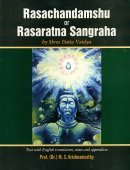Valuka, Vālukā, Valūka: 23 definitions
Introduction:
Valuka means something in Buddhism, Pali, Hinduism, Sanskrit, Jainism, Prakrit, the history of ancient India, Marathi, Hindi, biology. If you want to know the exact meaning, history, etymology or English translation of this term then check out the descriptions on this page. Add your comment or reference to a book if you want to contribute to this summary article.
Valuka has 22 English definitions available.
Languages of India and abroad
Sanskrit dictionary
[Deutsch Wörterbuch]
Source: Cologne Digital Sanskrit Dictionaries: Böhtlingk and Roth Grosses Petersburger WörterbuchValūka (वलूक):—[Uṇādisūtra 4, 40.] adj. roth oder schwarz: dāmatūṣāṇi valūkāntāni [Kātyāyana’s Śrautasūtrāṇi 22, 4, 20.] [Pañcaviṃśabrāhmaṇa 17, 1, 15.] [LĀṬY. 8, 6, 20.] [ANUPADA 5, 4.] Da das Wort nur in dieser Verbindung erscheint, wird es wohl eine speciellere Bedeutung haben, etwa Verbrämung, umlaufende Schnur oder Wulst. Nach [UJJVAL.] m. Vogel und Lotuswurzel; in der letzten Bed. n. nach [Uṇādikoṣa]
--- OR ---
Vāluka (वालुक):—(von vālukā)
1) adj. a) aus Sand gemacht: setu [Spr. 5079.] — b) sandhaltig, sandartig. —
2) m. ein best. vegetabilisches Gift [Hemacandra’s Abhidhānacintāmaṇi 1197.] —
3) f. ī a) Sandbad. — b) Kampher [Śabdacandrikā] bei [WILSON.] — c) Cucumis utilissimus (vgl. vāluṅkī) [Hemacandra’s Abhidhānacintāmaṇi 1189.] [Halāyudha 2, 54.] [Jaṭādhara] bei [WILSON.] —
4) n. = elavāluka, harivāluka [Amarakoṣa 2, 4, 4, 9.] [Hemacandra’s Anekārthasaṃgraha 3, 98.] [Medinīkoṣa Nalopākhyāna 121.]
--- OR ---
Vālukā (वालुका):—f. (gew. pl.) Sand [Amarakoṣa 3, 4, 14, 76.] [Hemacandra’s Abhidhānacintāmaṇi 1089.] [Anekārthasaṃgraha 3, 75. 98.] [Medinīkoṣa k. 130. fg.] [Halāyudha 3, 48.] [ŚVETĀŚV. Upakośā 2, 10.] [Manu’s Gesetzbuch 8, 250.] [Mahābhārata 3, 10723. 13530.] vālukāsviva mudritam [Spr. 677 (II). 4787.] [Suśruta 1, 171, 21.] [Śārṅgadhara SAṂH. 3, 2, 14.] [Sāhityadarpana 64, 11.] [Pañcatantra 205, 8.] [Daśakumāracarita 91, 16.] vālukārṇava Sandmeer, Sandwüste [Mahābhārata 17, 48.] [Rājataraṅgiṇī 4, 289. 294.] vālukāmbudhi dass. [172.] Am Ende eines adj. comp. (f. ā) [Rāmāyaṇa 1, 2, 7. 2, 55, 31. 5, 16, 35.] [Harivaṃśa 9005. fg.] [Varāhamihira’s Bṛhajjātaka S. 54, 83. 91.] Scheinbar Name einer Hölle [Mahābhārata 13, 5491], wo aber mit der ed. Bomb. ghoravālukaṃ zu lesen ist. — Vgl. karambha unter karambha
1) a) [?(Mahābhārata 18, 50] liest. die ed. Bomb. vālukāstaptāḥ), taptabāluka, brahmavāluka, rakta, sthūlavālukā .
--- OR ---
Vālūka (वालूक):—m. = vāluka
2) [Hemacandra’s Abhidhānacintāmaṇi 1197, v. l.]
--- OR ---
Vālukā (वालुका):—, ciraṃ jīvanti niḥsnehāḥ pṛthivyāṃ vālukādayaḥ [Spr. (II) 2296.]
Sanskrit, also spelled संस्कृतम् (saṃskṛtam), is an ancient language of India commonly seen as the grandmother of the Indo-European language family (even English!). Closely allied with Prakrit and Pali, Sanskrit is more exhaustive in both grammar and terms and has the most extensive collection of literature in the world, greatly surpassing its sister-languages Greek and Latin.
See also (Relevant definitions)
Starts with (+10): Valukabdhi, Valukabhaya, Valukacaityakrida, Valukachaityakrida, Valukadi, Valukagada, Valukagama, Valukai, Valukaila, Valukala, Valukalinga, Valukamaya, Valukambhas, Valukambudhi, Valukantara, Valukapatta, Valukappirapai, Valukaprabha, Valukaprabhe, Valukarama.
Ends with (+17): Agnivaluka, Ailavaluka, Anetantuvaluka, Brahmavaluka, Elavaluka, Elvaluka, Elvavaluka, Gamgavaluka, Gamgevaluka, Gavaluka, Ghoravaluka, Harivaluka, Hemavaluka, Himavaluka, Jalavaluka, Kaluvaluka, Karambhavaluka, Madhvaluka, Nadivaluka, Pitavaluka.
Full-text (+60): Valua, Taptavaluka, Valvangiri, Harivaluka, Valukayantra, Valukacaityakrida, Valuki, Valukatmika, Raktavaluka, Svacchavaluka, Pitavaluka, Rukshavaluka, Brahmavaluka, Himavaluka, Baluka, Valukatva, Valukambudhi, Valukambhas, Himabaluka, Valukagada.
Relevant text
Search found 15 books and stories containing Valuka, Vālukā, Vāḷūka, Vālūka, Valūka, Vāluka, Vālūkā, Vāḷuka; (plurals include: Valukas, Vālukās, Vāḷūkas, Vālūkas, Valūkas, Vālukas, Vālūkās, Vāḷukas). You can also click to the full overview containing English textual excerpts. Below are direct links for the most relevant articles:
Garga Samhita (English) (by Danavir Goswami)
Verses 2.7.3-5 < [Chapter 7 - Kidnapping of the Calves and Cowherd Boys]
Verse 2.7.6 < [Chapter 7 - Kidnapping of the Calves and Cowherd Boys]
Bhagavati-sutra (Viyaha-pannatti) (by K. C. Lalwani)
Chapter 3: On the worlds (pṛthivī) < [Book 2]
Part 12 - On the earth-bodies, etc. < [Chapter 1]
Brihat Samhita (by N. Chidambaram Iyer)
The Garuda Purana (by Manmatha Nath Dutt)
Chapter XXIV - The worship of Ganapati < [Agastya Samhita]
Vishnudharmottara Purana (Art and Architecture) (by Bhagyashree Sarma)
5. Preparation of Canvas before Painting < [Chapter 5 - Painting and Image Making]
The Great Chronicle of Buddhas (by Ven. Mingun Sayadaw)
Chapter 1 - Salutation & Intention < [Volume 1.1]
Part 3 - King Suddhodāna’s invitation < [Chapter 16 - The arrival of Upatissa and Kolita]
Related products

